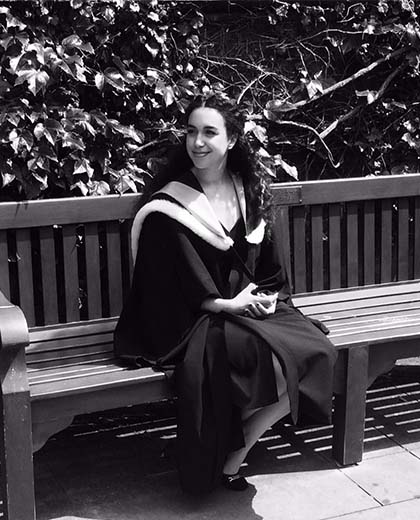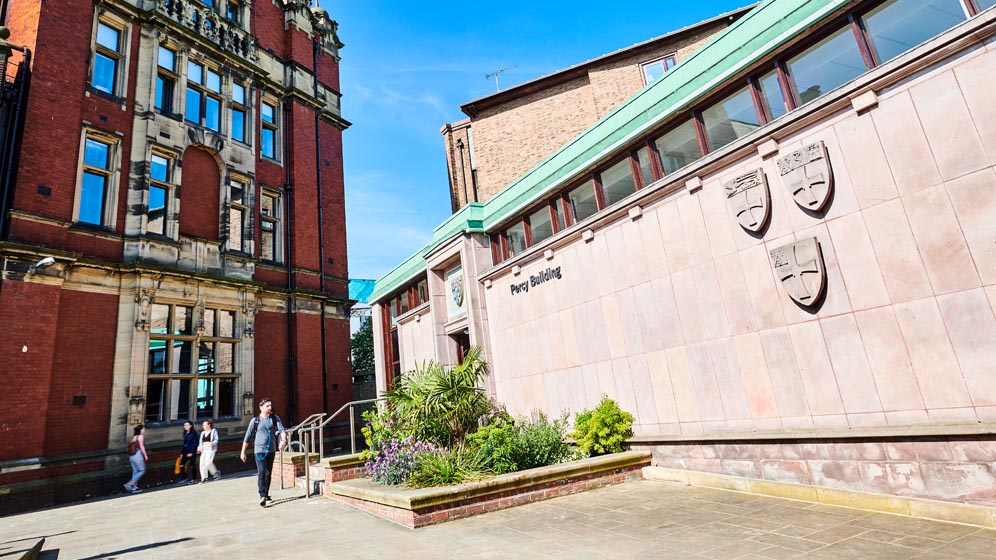English Language BA Honours
- UCAS code: Q302
- Full time
- 3 years
Pursue your passion for the English language by exploring the historical, structural and socio-cultural nature of English in an inspiring city and region with a distinct dialect.
You are currently viewing course information for entry year: 2025
Next start date:
- September 2025
UCAS Institution name and code:
- NEWC / N21
Course overview
This English Language BA Honours course encourages you to explore the English language in all its diversity – past and present, national and international, offline and online.
You'll investigate how English has developed over time. We'll look at how the language is used to mark regional, social and stylistic distinctions. You will learn from experts and world-leading researchers in English Language and Linguistics.
During this three-year English Language degree, you will:
- study how English has evolved over time, how it is acquired, and how it develops in the mind
- examine the grammatical structures and sound systems of different varieties of English
- explore how historical, social and other contexts impact variation in English
- learn different methodologies for studying the use and complexities of English
Your course and study experience - disclaimers and terms and conditions
Please rest assured we make all reasonable efforts to provide you with the programmes, services and facilities described. However, it may be necessary to make changes due to significant disruption, for example in response to Covid-19.
View our Academic experience page, which gives information about your Newcastle University study experience for the academic year 2025-26.
See our terms and conditions and student complaints information, which gives details of circumstances that may lead to changes to programmes, modules or University services.
Quality and ranking
Professional accreditation and recognition
All professional accreditations are reviewed regularly by their professional body.
Modules and learning
Modules
The information below is intended to provide an example of what you will study.
Most degrees are divided into stages. Each stage lasts for one academic year, and you'll complete modules totalling 120 credits by the end of each stage.
Our teaching is informed by research. Course content may change periodically to reflect developments in the discipline, the requirements of external bodies and partners, and student feedback.
Optional module availability
Student demand for optional modules may affect availability.
Full details of the modules on offer will be published through the Programme Regulations and Specifications ahead of each academic year. This usually happens in May.
To find out more please see our terms and conditions
You will build a foundation for describing and analysing the English language. There will be a focus on sounds, words, meaning and sentence structure. You’ll also learn about other topics relating to English Language, such as language acquisition and psycholinguistics.
You’ll explore variation in English across time, space, and social groups. At the same time you'll practice different ways of collecting and analysing language data, and presenting research findings.
You will also have the opportunity to broaden your knowledge and try something new. A selection of modules are available from other humanities subjects, such as History, Philosophy, or Sociology.
Modules
Optional modules
You will also choose two optional modules (totalling 40 credits). You will select these from a list of over 100 modules from across different subjects, including Archaeology, Classics, Classical Languages, Creative Writing, Education, English Literature, Geography, History, History of Art, Modern Languages, Music, Philosophy, Politics, Psychology, and Sociology.
You will focus on the historical and social context in which English evolves. You will explore in more depth how and why the English language has changed over time, how it is acquired by children, non-native speakers and neuro-diverse individuals, and why it varies across individuals, social groups and societies. You will learn empirical and quantitative methods for analysing the structure of English in all its forms and guises.
Modules
| Compulsory Modules | Credits |
|---|---|
| Sociolinguistics | 20 |
| Early English: Texts, Patterns and Varieties | 20 |
You will also choose one of the following three modules:
| Module | Credits |
|---|---|
| Phonological Theory | 20 |
| Syntactic Theory | 20 |
| Pragmatic Theory | 20 |
You only take one of the following modules if you undertake the Study Abroad exchange programme:
You will work to develop your own interests, choosing from topics linked to the research specialisms of your lecturers. These may include language origins and evolution, child first and second language acquisition, language and ageing, advanced phonology or syntax and the history of English grammar.
You will also undertake a dissertation project, leading your own research in close collaboration with a faculty supervisor.
Modules
We base these figures and graphs on the most up-to-date information available to us. They are based on the modules chosen by our students in 2024-25.
Teaching time is made up of:
- scheduled learning and teaching activities. These are timetabled activities with a member of staff present.
- structured guided learning. These are activities developed by staff to support engagement with module learning. Students or groups of students undertake these activities without direct staff participation or supervision
Teaching and assessment
Teaching methods
You can normally expect to spend around 10 hours per week attending lectures, seminars, workshops and film screenings. You also spend around 25 hours per week on class preparation, reading, writing, and other kinds of independent research recommended by your lecturers.
Assessment methods
You'll be assessed through a combination of:
-
Assignments – written or fieldwork
-
Coursework
-
Dissertation or research project
-
Essays
-
Examinations – practical or online
-
Group work
-
Presentations
Skills and experience
Practical experience
Studying English Language at Newcastle means you will benefit from access to our state-of-the-art Linguistics Laboratory. The LingLab hosts collections of English language data for analysis of linguistic variation and change. It also hosts a range of equipment for advanced articulatory, phonetic and psycholinguistic research. Activities are supported by a dedicated lab manager.
Research skills
As part of your degree, you will complete an independent research project in your final year. You will collaborate with a faculty member to investigate a novel topic in English Language that you are passionate about.
You will also be offered a range of opportunities to participate in staff research projects. Though this is not a four-year degree generally, some students do a placement year.
Opportunities
Study abroad
You can study abroad for one semester in your second year as part of this degree. In Europe we have links with:
- Ghent University, Belgium
- Leipzig University, Germany
- Groningen University, Netherlands
- Radboud University Nijmegen, Netherlands
We also have links with universities in other parts of the world, including Australia, Brazil, Canada, Hong Kong, Singapore, South Korea and the USA, including, but not limited to:
- Monash University, Australia
- University of Sydney, Australia
- McGill University, Canada
- University of Hong Kong
- University of Vermont, USA
Find out more about Study Abroad.
Work placement
During your degree, you’ll have multiple opportunities to undertake a meaningful work placement. In your second and third years, you may choose to take the Career Development Module which offers academic credit for 50 hours of placement. You can choose to carry out your placement via part-time work, volunteering, or in a local school. You will be assessed through a mixture of written work, presentations, and professional skills assessment.
In addition, you'll have the option to spend 9 to 12 months on a work placement. You will receive University support from our dedicated Careers team to help you secure your dream placement in the UK or abroad. Work placements take place between stages 2 and 3.
You'll gain first-hand experience of working in a sector, putting your learning into practice, and developing your professional expertise. Previous placements have been in a range of sectors, including:
- journalism and broadcasting
- sustainable energy
- politics
- digital media and marketing
- education
- finance
- museum and heritage
- travel and tourism
If you choose to take a work placement, it will extend your degree by a year. Placements are subject to availability.
Facilities and environment
Facilities
You'll be based in the School of English Literature, Language and Linguistics. The School is located in the Percy Building, which is at the heart of our city-centre campus. You'll join a lively community of students, academics, writers, and professionals.
You'll have access to:
- a library of 1.4 million books and 54,000 journals on 26km of shelving
- the Percy Building’s student common rooms, study areas and café
- Northern Stage, Great North Museum & the Hatton Gallery for events and exhibitions
- the Students' Union for shops, societies and gigs
- a digital media lab for developing documentaries and film-making
- the School of Modern Languages’ Language Resource Centre
You'll also have access to a diverse programme of events, including spoken-word events and creative writing courses.
Find out more about the School of English Literature, Language and Linguistics
Support
You'll have the support of an academic member of staff as a Personal Tutor throughout your degree to help with academic and personal issues affecting your academic progress.
Peer Mentors will help you in your first year. They are fellow students who can help you settle in and answer questions you may have when starting university.
Your future
English Language and Linguistics students acquire a range of valuable skills which equip them to pursue diverse career paths.
Your training can be used in:
- teaching English as a foreign language
- publishing
- journalism
- advertising, branding and marketing
- information services and data science
You will gain skills such as critical reasoning and problem solving, project and data management, oral and written communication, collaboration and independent research.
Our degrees provide excellent preparation for a wide number of professions. With further training, our graduates have also become:
- lexicographers
- translators and interpreters
- speech and language therapists
- social researchers
- legal sector workers (including forensic linguists)
Employability
Employability and the engagement with the wider world go hand-in-hand in this degree.
Many of our modules, particularly in Stage 3, model their assessments on the kind of tasks you might be employed to do:
- constructing marketing briefs
- drafting website copy
- curating exhibitions
- designing experiments
- coding websites
- analysing data
- writing a clear and persuasive argument.
Beyond our modules, there are plenty of extracurricular opportunities. These range from freelance work for Newcastle’s student newspaper to paid internships in the department. In particular, the Newcastle Centre for Literary Arts hires students to work on everything from event management to app design.
Follow in their footsteps

- Name: Khadija
- Nationality: British
- Graduated: 2016
- Now working as: Community Engagement Manager at National Institute for Health and Care Research
"There are many elements to the English Language degree, so you can tailor it to your interests. I was interested in the social aspects of the language and the ways it links to social justice and equality, which is what my career focuses on."
Find out what Khadija liked the most about studying English Language at Newcastle University and how this degree helped her in her career.
Careers support
Our Careers Service is one of the largest and best in the country, and we have strong links with employers. We provide an extensive range of opportunities to all students through our ncl+ initiative.
Visit our Careers Service website
Recognition of professional qualifications outside of the UK
From 1 January 2021 there is an update to the way professional qualifications are recognised by countries outside of the UK
Entry requirements
All candidates are considered on an individual basis and we accept a broad range of qualifications. The entrance requirements and offers below apply to 2025 entry.
| A-Level | |
|---|---|
| International Baccalaureate | |
|---|---|
Other UK and the Republic of Ireland qualifications
Contextual Offers
Through one of our contextual routes, you could receive an offer of up to three grades lower than the typical requirements.
Qualifications from outside the UK
English Language requirements
Entrance courses (INTO)
International Pathway Courses are specialist programmes designed for international students who want to study in the UK. We provide a range of study options for international students in partnership with INTO.
Find out more about International Pathway Courses
Admissions policy
This policy applies to all undergraduate and postgraduate admissions at Newcastle University. It is intended to provide information about our admissions policies and procedures to applicants and potential applicants, to their advisors and family members, and to staff of the University.
University Admissions Policy and related policies and procedures
Credit transfer and Recognition of Prior Learning
Recognition of Prior Learning (RPL) can allow you to convert existing relevant university-level knowledge, skills and experience into credits towards a qualification. Find out more about the RPL policy which may apply to this course.
Tuition fees and scholarships
Tuition fees for academic year 2025-2026
See our ‘Home Fee Students’ and ‘International Fee Students’ information below for more information on tuition fee levels, fee status and inflationary fee increases.
| Qualification: BA Honours | |
|---|---|
|
Home students full time 3 years |
Tuition fees (Year 1)
£9,535 |
|
International students full time 3 years |
Tuition fees (Year 1)
23800 |
Year abroad and additional costs
For programmes where you can spend a year on a work placement or studying abroad, you will receive a significant fee reduction for that year.
Some of our degrees involve additional costs which are not covered by your tuition fees.
Scholarships
Find out more about:
Open days and events
You'll have a number of opportunities to meet us throughout the year at our on-campus and virtual open days.
You'll be able to:
- explore our beautiful campus
- find out about our vibrant city
- discover what students think about studying at Newcastle
You'll also have the opportunity to speak to academic staff and find out more about the subjects you're interested in.
Find out about how you can visit Newcastle in person and virtually.
We regularly travel overseas to meet with students interested in studying at Newcastle University. Visit our events calendar to find out when we're visiting your region.
How to apply
Apply through UCAS
To apply for undergraduate study at Newcastle University, you must use the online application system managed by the Universities and Colleges Admissions Service (UCAS). All UK schools and colleges, and a small number of EU and international establishments, are registered with UCAS. You will need:
- the UCAS name and institution codes for Newcastle University (NEWC/N21)
- the UCAS code for the course you want to apply for
- the UCAS 'buzzword' for your school or college
If you are applying independently, or are applying from a school or college which is not registered to manage applications, you will still use the Apply system. You will not need a buzzword.
Apply through UCASApply through an agent
International students often apply to us through an agent. Have a look at our recommended agents and get in touch with them.
Get in touch
By phone
Call us on +44 (0) 191 208 3333 and press option 1. Our opening hours are Monday to Friday 10am until 4pm.
Live chat
Our NCL chatbot might be able to give you an answer straight away. If not, it’ll direct you to someone who can help.
You'll find our NCL chatbot in the bottom right of this page.
Online
Keep updated
We regularly send email updates and extra information about the University.
Receive regular updates by email










